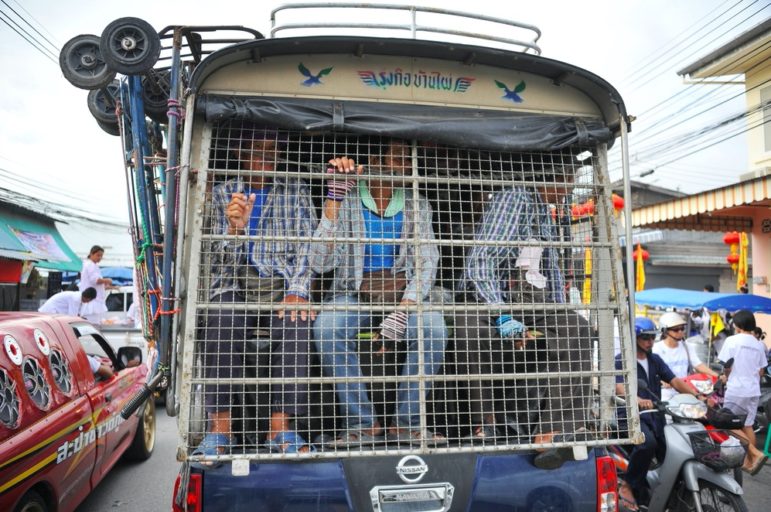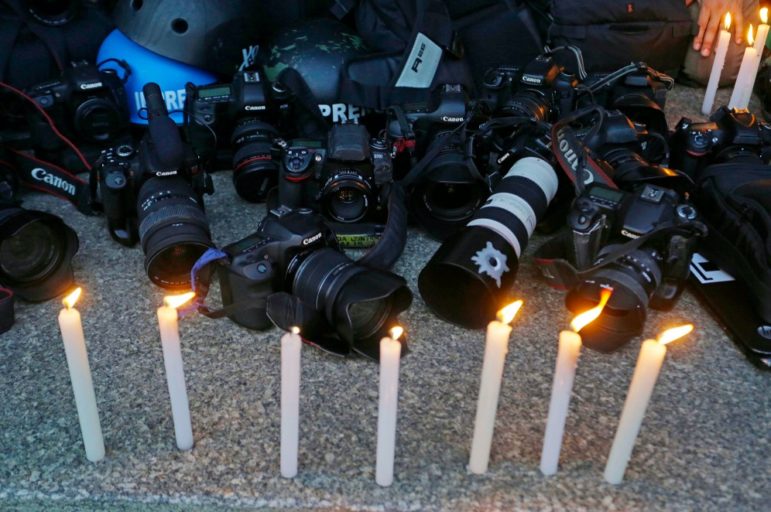

Image: Screenshot
Forced Labor and Fair Recruitment: A Toolkit for Journalists
Facts are the basis for all investigative journalism.
In many cases facts are nothing more than dry numbers on a page, but with a proper understanding and interpretation they can reveal stories of real interest.
You will be surprised how often a vital component of a story involves poring over and analyzing figures. It can be a long and tedious job, combining the skills of an accountant and a detective.
Resources
Learn to love documents. Your investigation will be stronger if you support your claims with documentation. If it is from an official or highly respected source, so much the better.
The sorts of documents which might be useful for you include:
• Official statistics on forced labor and labor migration, including available data on recruitment costs;
• Company publications (annual reports, web sites) which disclose corporate policy on recruitment, employment, and ethics;
• Court documents — the verdicts of trials, charge sheets, arrests, prosecutions;
• Newspaper articles about similar cases.
Photographs and Videos
Photographs, and increasingly video, are a vital part of modern storytelling.
But forced labor and unfair recruitment usually take place in the shadows, and both perpetrators and victims may not be willing to be identified. If they do, photojournalists and videographers reporting these issues need to consider the impact their work may have on their subjects.
Below are the views of three photographers:
Melanie Hamman: “Through my photography I work to reveal the reality and horror of human trafficking. Yet in doing so I am acutely aware of the traumatic scars these experiences leave inside their victims. Being a journalist does not give me the right to invade their lives in ways that will reignite their pain.”
Lisa Kristine: “I imparted to the people I was photographing that I wanted to illuminate their stories and their plight, so when it was safe for them, and safe for me, I made these images.
“They knew their image would be seen by you out in the world. I wanted them to know that we will be bearing witness to them, and that we will do whatever we can to help make a difference in their lives. I truly believe, if we can see one another as fellow human beings, then it becomes very difficult to tolerate atrocities like slavery.
“These images are not of issues. They are of people, real people, like you and me, all deserving of the same rights, dignity and respect in their lives.”
Nadia Bseiso: “I’ve been in situations where I’m photographing people in difficult situations and they act out of impulse because they want to share their story at all cost. It was my duty as a photographer to fully make them aware of the consequence of their actions, stopping them sometimes to think.
“What I always say is at the end of the day, no matter how much time I spend, how close or attached I get to the people I photograph, I leave and go to my home. They are the ones who stay behind when I leave, so safety for them first, they entrusted you with information, be smart about it.
“Think long term, rather than short term. There are many ways to tell the story without causing problems, including not showing identity, hiding faces, changing names; you can always find a way around it.”
If someone agrees to be photographed (or filmed), but asks that they not be identified, it is far, far better to protect their identity during the filming — for example, by only photographing them in silhouette or by filming only the interviewee’s hands — rather than relying on post-production techniques such as pixelating or hiding the person’s face during the edit or production process.
This is because the original image otherwise contains the source’s identity. There is always the risk that it might fall into the wrong hands or be published accidentally.
Safety
Following the ethical standards of a professional journalist will not protect you from all harm, but it is a necessary first step.
If you can, join a union or journalists’ association which has a strong ethical code. Learn it, and abide by it.
Get a press card — usually a membership card issued by a journalists’ association or union — and carry it with you at all times.
Here are some top tips for staying safe in your reporting:
Be Accurate: Report as fact only information which you have checked and double-checked and know to be true. Everything else is a claim, and should be attributed. That means writing that someone says or claims something, rather than that it is true.
Take care to report claims accurately. Do not draw conclusions that are not justified by what you have been told.
Report according to the limits of your ability. If you are covering a sensitive issue, report on what you can see, or at least what you are told by those around you.
Leave the analysis, interpretation and speculation to others who have other sources and can see the bigger picture.
Be Skeptical: Analyze all information you are given on a situation.
Consider recording the conversations you have with anyone involved in a sensitive story you are covering. Later, they may be pressured to deny your reports, and you may need to present your recordings and transcripts to a court.
Be Balanced: Actively seek out the views of all parties. If they will not speak to you, or you can not reach them, look for an authoritative source of their position, such as their official website or news agency.
If you fail, explain why: “For such and such reason, it has not been possible to reach the following source of information.” Do not act as a judge, advocate, or human rights activist. Leave this to the experts who can brief you and give you analyses.
Be Impartial: Do not promote the views of one side of the story over the others.
Do not use language (usually adjectives) to describe how good (strong, heroic, determined, rightful) one side is, or how terrible (evil, weak, cowardly) the other side is. Recognize that words used widely and without intended prejudice in one community can cause offence among another. Would you like to be described as a “tribal” or “aboriginal?”
Show respect to other people. Find out how they themselves prefer to be described.
Recognize when your own bias appears in your reporting, and remove it.
Personal Safety
The safety of journalists is an important topic. On average, a journalist is killed every five days for bringing information to the public.
Attacks on media professionals are often perpetrated in non-conflict situations. Journalists who are reporting on issues such as unfair recruitment or forced labor are particularly at risk — even if they do so in a balanced and objective way.
You are likely to be exposing criminal organizations or powerful individuals, or even government abuses. Reprisals may range from intimidation and harassment to actual violence, illegal arrest, and arbitrary detention.
You may even risk no longer being able to report in the country. You can be forced to flee, or, for journalists who are migrant workers themselves, you may risk losing your work permit. There are many resources on promoting the safety of journalists. See a selection of key resources:
UN Plan of Action on the Safety of Journalists and the Issue of Impunity
Physical and Mental Health
Be mentally prepared for a traumatic assignment. Talk to family, friends and colleagues. Know what you are getting in to. Look for healthy ways to release stress.
Share stories and experiences with your fellow journalists. Learn from each other.
Debrief your bosses and colleagues when you return. It is important that they know what you have been through. Do not let your experiences fester deep within you, where they may become harder to talk about.
Seek professional support. There is no shame in being affected by the shocking things you have witnessed or the stories that you have been told. It is normal for someone who has experienced a trauma to feel shock, anger, sadness, grief and helplessness.
Expect support from your bosses. They have a duty of care towards you if you suffer ill effects from your assignment. They should be sympathetic to giving you some time off work, and help you to find an appropriate person to talk to about your experiences.
Be aware of any potential risks to your physical health. The workplaces you visit might involve safety hazards, for example, in mines or on construction sites. Prepare your investigation well and seek information on potential risks in advance.
Digital Security
Remember that information about the phone calls you make is stored on your phone, and your computer stores every email you send and receive.
Do not keep the name or contact details of sensitive sources in your handwritten notes, books, in your mobile phone or in computer files.
- Give your sensitive contacts a code name and use this in your notes.
- Protect your mobile phone with a PIN code that others will not guess.
- Store the contact details of sensitive sources under a different name.
- Delete records of sensitive calls you make and receive immediately.
- Delete text messages you send and receive.
- Use email aliases to reduce message traffic.
- Disguise sensitive numbers in another format — for example, write them to look like dates or statistics.
- Learn how to use higher security for your web browsing.
- Learn how to send encrypted emails.
- Take care with what you post on social media.
Going Undercover
It is a general rule of journalism that reporters should be open and honest about who they are. They should not disguise their identity or activity in order to gain access to information that would not be shared with a reporter — for example, by pretending to be a doctor or a family member.
However, it can be very hard to gather convincing evidence of crime and antisocial behavior while being fully transparent — in essence, saying: “So please tell me about all the bad things you’ve done, so I can write about them in my newspaper.”
This is why when — and only when — there is genuinely strong public interest reason to suggest crime or serious antisocial behavior, some investigative reporters will take on an assumed identity, for example, by pretending to be an unskilled worker to take a job where workers are abused.
Going undercover is time-consuming, as it can take many weeks to gain the trust of the employer.
It is expensive, because the news organization will have to keep paying the reporter’s wages while he or she is actually working elsewhere. (In order to avoid prosecution for fraud, most undercover reporters will set aside any earnings they get from the employer, and return them when they leave.)
It is also risky. If the reporter makes covert sound or video recordings, a court may decide that they are an invasion of privacy and illegal. Finally, it can be dangerous.
Reporters who are uncovered may be subjected to threats and even physical violence.
Never go undercover without the explicit support of your news organization. If things go wrong, they will need to bail you out and support you.
Plan well. Consider:
- How will you join the organization you are about to expose?
- Will you work alone?
- How will you make sure that you are safe?
- What is your undercover identity and story?
- How will you avoid asking too many questions and arousing suspicion?
- How will you get the information out?
- How will you get yourself out if things go wrong?
Maintain discreet but frequent contact with your colleagues so they know where you and what you are doing.
Sources
It is not easy to reach out to people who are affected by forced labor or unfair recruitment practices.
Those responsible for their predicament will try to hide them from reporters and the authorities. You may find the victims by visiting establishments where the practice is rife.
You may receive a tip-off from a member of the public, or from organizations that represent or provide services for workers (workers’ organizations, support groups, associations, social services, and care services).
You can get information from a diversity of sources, including workers and their families, employers or agents and intermediaries that orchestrate recruitment as well as academics.
But what then?
However unhappy they are about the situation they find themselves in, speaking out may only exacerbate the problem and possibly put them in danger.
You will need to be sensitive and respectful, while at the same time encouraging them to provide you with information.
Sources: Survivors

Human trafficking victims may be very reluctant to talk about their experiences. Image: Shutterstock, Tinnakorn Jorruang
You must not pressure them, but it is fair to tell victims that speaking out will inform the public about the scale and nature of the problem. It may give others the confidence to speak out about their plight. And it may warn others of the dangers they may face in traveling across borders for the promise of a job which turns out not to be as promised or to trust agents who might not be worth trusting.
If you want people to open up to you about traumatic experiences, you need to win their trust. Victims of abuse and violence must know that they will not be denigrated or revictimized by your reporting. The stories that you write about survivors of abuse and atrocities will also determine whether your interviewees will want to talk to you again for follow-up stories.
Being professional while interviewing survivors of trauma does not mean that you have to be cold and distant. It means being confident and assured, without being bossy or officious. Be empathetic and express sympathy.
You should always treat victims/survivors and their families with compassion, care, respect, and dignity. This does not mean you should stop being a skeptical journalist working to find the truth. But it does mean realizing that you are in a situation where your interviewee might be in great emotional pain and distress.
Depending on the situation, it is advisable to let the interviewee choose the interview venue. You want them to be in a place where they feel comfortable talking.
Victims and survivors may request that you do not publish any information which could lead to them being identified. News organizations are often reluctant to use anonymous sources because it has the effect of weakening the impact of the testimony. However, it must be acknowledged that speaking out can lead to further trauma and humiliation for some people.
There may also be the danger that those accused attempt to punish those who speak out. It is vital that reporters do not allow this to happen.
If you promise to protect their anonymity, you must ensure that you do so. Take care that their identity is not revealed, even inadvertently by publishing so much information about the person that someone close to them could work out who you are talking about.
In some very sensitive cases, it goes beyond not mentioning their name or identity in pieces that you publish. You must also keep their identity secret in your own notes, in case these fall into hostile hands. If you are stopped at a border or arrested by the police, your notes will almost certainly be pored over in great detail.
Watch below: The Associated Press’ Martha Mendoza provides advice for journalists reporting on human trafficking.
Sources: Support Groups, Advocacy Organizations, Academics
Whereas much of the power and emotional impact of a story will come from testimonies of those directly impacted, it will gain strength when bringing a wider perspective, placing the story of one or more individuals into context. To do this, get information from experts working in the field, such as:
- Support groups for victims and survivors
- Law enforcement agencies
- Politicians with a specialist interest in the issue.
- Trade unions
- Associations
- Social services and other public services
- Academics
They have access to the people in power and can ask questions that you might not be able to:
- Lawyers who act for the victims of forced labour and/or unfair recruitment; and
- Global organizations, such as the ILO, whose duty is to maintain awareness of the scale of the problem, its causes and effects and to propose policy options to address them. Find out who these people are, and get to know what they are doing.
When you meet one such person, ask them to suggest someone else you should speak to. Build up your network of contacts. Follow them on social media; read their published articles. Call them and ask them to brief you.
The more they see you engage with the subject, the more ready they will be to spend time explaining an issue to you, perhaps just for your information, but ultimately on the record as a quoted source in a story.
Over time, these people will come to acknowledge your interest and will start to approach you with potential stories.
Beware of becoming too close to any one of your professional contacts. They may, for perfectly understandable reasons (personal belief, organizational loyalty, etc.) tell you things that are not wholly accurate or fair. Retain your professional distance and do not be afraid to challenge them.
When you are researching your story, be sure to take detailed notes of what each person says to you. If, when you come to write the story, you are unsure of your understanding, you will be able to go back and check with the right person. You will also be able to attribute the opinions to the right people. You will soon lose the trust of anyone you misquote or to whom you attribute the wrong opinion.
Sources: Targets or Abusers
People accused of crimes or antisocial behavior should be the last people you contact in your investigation, when you have gathered all the evidence and built a strong case against them.
If you contact them too early, they will have the chance to put pressure on witnesses, destroy evidence — and scupper your investigation.
However, in the interest of fairness, you do need to give them a chance to respond properly to any allegations of wrongdoing made against them.
Many news organizations would consider one or two days sufficient time for the accused to give a considered response — but not enough for them to take action, whether legal or illegal — to prevent publication.
If they agree to meet, consider your own safety:
- Take a colleague along with you;
- Inform your editor where you are going;
- Have someone check up on you — even watch from a distance if you are especially worried;
- Take detailed notes or make a recording;
- Conduct the discussion professionally and politely;
- Do not permit yourself to become angry or indignant.
If they refuse to meet, you could ask them to answer your questions by phone or email.
A third option is for them to prepare a written (or recorded) statement for you to use as their response to the allegations against them.
You should be persistent in seeking a response, repeating that you want to hear their view of events in the interests of accuracy and fairness.
If you receive no reply after repeated contact, you should seek to represent their position as best you can, using publicly available sources. You would then write in your report words to the effect of:
“We contacted YYYY several times but they did not reply. However, on their website they claim to be an ethical employer and a member of the fair labour coalition. In an interview with ZZZ TV three years ago, the CEO said her company always upheld the law and operated by international standards wherever possible.”
Always be polite. As a journalist, your role is not to determine guilt, but to set out the facts as far as they can be established so that the public can reach their own conclusions.
This toolkit was originally published by the International Labour Organization and is excerpted here with permission.
Additional Resources
GIJN Resource Center: Human Trafficking, Forced Labor and Slavery
Reporting on Migration in the Gulf Arab Countries: A GIJN Guide
Tips for Reporting on Human Trafficking and Forced Labor
 The International Labour Organization is a United Nations agency devoted to promoting social justice and internationally recognized human and labor rights, pursuing its founding mission that social justice is essential to universal and lasting peace.
The International Labour Organization is a United Nations agency devoted to promoting social justice and internationally recognized human and labor rights, pursuing its founding mission that social justice is essential to universal and lasting peace.











